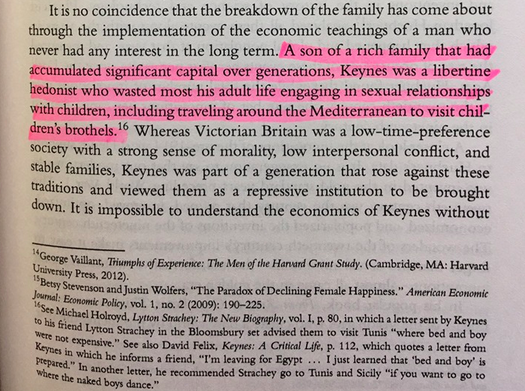
In free market circles, economist John Maynard Keynes is persona non grata.
Arguably the most influential economist of the 21st century, Keynes’s theories of economic interventionism have been embraced by demagogic politicians worldwide.
His theories have laid the foundations for massive government spending programs and non-stop government meddling in economic affairs. However, there is a darker side to Keynes that is often overlooked by many of his critics.
In the book, The Bitcoin Standard, author Saifedean Ammous critiqued Keynes’ ideas and also exposed the social implications of his economic programs. One poignant aspect of his critique was centered around the breakdown of the family unit under interventionist systems of government.

Ammous explains that the growth of government is detrimental to healthy families:
Substituting the family with government largesse has arguably been a losing trade for individuals who have partaken in it. Several studies show that life satisfaction depends to a large degree on establishing intimate long-term familial bonds with a partner and children. Many studies also show that rates of depression and psychological diseases are rising over time as the family breaks down, particularly for women. Cases of depression and psychological disorders very frequently have family breakdown as a leading cause.
The economist uncovered a shocking revelation about Keynes’ life:
It is no coincidence that the breakdown of the family has come about through the implementation of the economic teachings of a man who never had any interest in the long term. A son of a rich family that had accumulated significant capital over generations, Keynes was a libertine hedonist who wasted most his adult life engaging in sexual relationships with children, including traveling around the Mediterranean to visit children’s brothels.
Ammous contrasted Keynes’ lifestyle with that of the previous Victorian era in Britain:
Whereas Victorian Britain was a low-time-preference society with a strong sense of morality, low interpersonal conflict, and stable families, Keynes was part of a generation that rose against these traditions and viewed them as a repressive institution to be brought down. It is impossible to understand the economics of Keynes without understanding the kind of morality he wanted to see in a society he increasingly believed he could shape according to his will.
One of the most powerful concepts highlighted in Ammous’ book is time preference—the degree that people value current consumption over future consumption. He argues that central banking has created perverse incentives throughout the U.S. economy.
Not only that, but it has also affected people’s decision-making when it comes to social behavior. Combined with a managerial state that promotes diversity at all costs, you have the makings of a nasty cocktail of state-sponsored degeneracy with economic turmoil coming further down the line.



